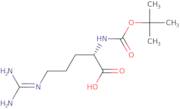Informations sur le produit
- Boc-L-Arg-OH
- (2S)-2-[[(tert-Butoxy)carbonyl]amino]-5-carbamimidamidopentanoic acid
- (2S)-5-(Diaminomethylideneazaniumyl)-2-[(2-methylpropan-2-yl)oxycarbonylamino]pentanoate
- (S)-2-[(tert-Butoxycarbonyl)amino]-5-guanidinopentanoic acid
- <span class="text-smallcaps">L</span>-Arginine, N<sup>2</sup>-[(1,1-dimethylethoxy)carbonyl]-
- Arginine, N<sup>2</sup>-carboxy-, N<sup>2</sup>-tert-butyl ester, <span class="text-smallcaps">L</span>-
- Boc-<span class="text-smallcaps">L</span>-arginine
- Boc-Arg-OH
- Boc-L-arginine
- N-alpha-(tert-butoxycarbonyl)-L-arginine
- Voir d'autres synonymes
- N-tert-Butoxycarbonyl-<span class="text-smallcaps">L</span>-arginine
- N-α-Butyloxycarbonyl-<span class="text-smallcaps">L</span>-arginine
- N<sup>2</sup>-[(1,1-Dimethylethoxy)carbonyl]-<span class="text-smallcaps">L</span>-arginine
- N<sup>2</sup>-tert-Butoxycarbonyl-<span class="text-smallcaps">L</span>-arginine
- N~2~-(tert-butoxycarbonyl)-N~5~-(diaminomethylidene)-L-ornithine
N-alpha-Boc-L-arginine is a tetrapeptide that has been shown to induce apoptosis in cancer cells. This drug interacts with the carboxylate moiety of the peptide and activates an enzyme called proton pump, which generates hydrogen ions. These hydrogen ions will then interact with chloride ions to form hydrochloric acid, causing a decrease in pH. The acidic environment created by this reaction causes the protein synthesis to stop and cell death. N-alpha-Boc-L-arginine is active against colorectal carcinoma cells, but not against cisplatin resistant cells. It has been shown to be a potential chemotherapeutic agent for the treatment of various types of cancer.





